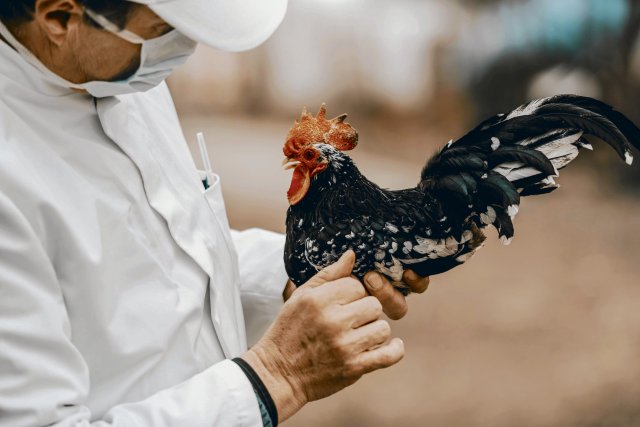Podcast | Lighthouse in the Desert
At the beginning of the pandemic, the podcast "Coronavirus Update" was one of the most reliable and accessible sources of information in the German media landscape. Every morning, one of the world's leading coronavirus experts, Dr. Christian Drosten, provided insights and perspectives on the pathogen and its spread, possible countermeasures, and the current state of research. The podcast, hosted by Korinna Hennig, Anja Martini, and Beke Schulmann, has won more than half a dozen awards; it was considered an outstanding example of constructive journalism—especially because it didn't underwhelm listeners.
Five years after the start of the pandemic, NDR has launched an update to the update and produced a further ten episodes dedicated to the question of what lessons science has learned from the pandemic. Unlike the original update, the episodes are structured as reports; they cover topics such as how laboratories work and function, how zoonoses (pathogens that can be transmitted from animals to humans and vice versa) are monitored, how veterinary medicine deals with pandemics, and the long-term health consequences such as long COVID.
The question remains unanswered: Can researchers hide behind politics?
-
The podcast comes at the right time, as research in the US has suffered one severe blow after another since Trump's inauguration. The entire infrastructure of US research is being slashed and burned; doubts arise as to whether much relevant science will be able to continue in the future. The avian flu currently rampant in the US and Canada is already showing the impact of a lack of government oversight and underfunding of science: We simply don't know enough about this hotbed of danger.
What we do know is that the virus has occasionally jumped to humans, and that human-to-human transmission has very likely also occurred. This doesn't mean that a new pandemic is imminent, but they are warning signs that warrant a closer look at how the virus is developing. However, at least in the US, that's not happening right now – and the experts interviewed sound correspondingly concerned and alarmed.
Anyone wanting an initial overview of how the scientific community views the current situation will be well served by the new episode of "Coronavirus Update." What it doesn't aim to do, despite the problem repeatedly appearing in the margins, is provide a societal reappraisal of the years of the epidemic. The podcast focuses on medical perspectives, leaving sociopolitical ones out of the picture. If anything, politics and society appear as fields that need to be cultivated by science: Accordingly, episode seven focuses heavily on communication and political advice, without raising the question of the extent to which medicine and research are inherently ideological.
Sometimes the larger intellectual framework that COVID-19 has opened up is missing. Not only have representatives of medical disciplines repeatedly attracted attention with sociopolitical statements (who should be infected, when, and how, for example, or how to triage patients under the conditions of a pandemic) – especially in Germany, the world champion in dealing with the past, there is certainly potential to question the extent to which research can retreat to saying: We provide findings, the classification must be done by politicians. Hardly any other professional group was similarly entangled in Nazi crimes; the fact that doctors and researchers today stand up and say we will leave the evaluation to others and take no position is either dramatic, irresponsible, or at least naive. It would have been worth at least one episode to discuss sociological aspects. The concept of the podcast thus amounts to a denigration of the humanities and social sciences, although this is not necessarily its fault. A cultural landscape that accepts Richard David Precht as a media beacon can be nothing other than a very flat desert.
This "Coronavirus Update" doesn't ask such questions. And it probably won't in the future either. While the successful channel will continue to be used by ARD, something else is now happening there: a series "11KM Stories," "a feed for exciting storytelling," to which Update creator Korinna Hennig invites you: "In multi-part series, ARD journalists tell you true stories and in-depth research, and how they have surprisingly developed." If you scroll down surprisingly far, you'll still find all seasons of the "Coronavirus Update."
The “Coronavirus Update” is freely accessible in the ARD audio library (ardaudiothek.de).

The nd.Genossenschaft belongs to our readers and authors. Through the cooperative, we guarantee the independence of our editorial team and strive to make our texts accessible to everyone—even if they don't have the money to help finance our work.
We don't have a hard paywall on our website out of conviction. However, this also means that we have to repeatedly ask everyone who can contribute to help finance our journalism. This is stressful, not only for our readers, but also for our authors, and sometimes it becomes too much.
Nevertheless: Only together can we defend left-wing positions!
With your support we can continue to:→ Provide independent and critical reporting. → Cover issues overlooked elsewhere. → Create a platform for diverse and marginalized voices. → Speak out against misinformation and hate speech.
→ Accompany and deepen social debates from the left.
nd-aktuell


